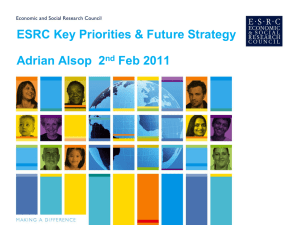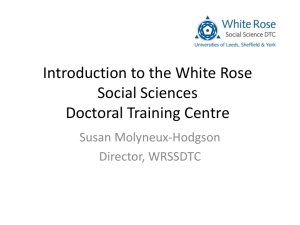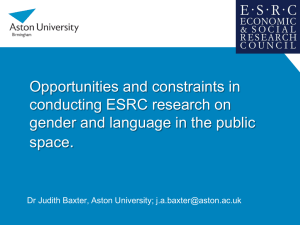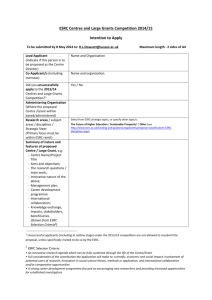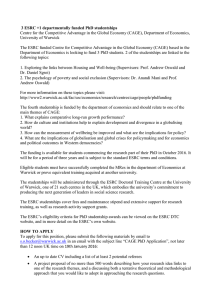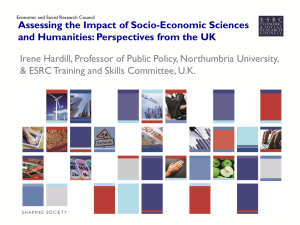Document 12812598
advertisement
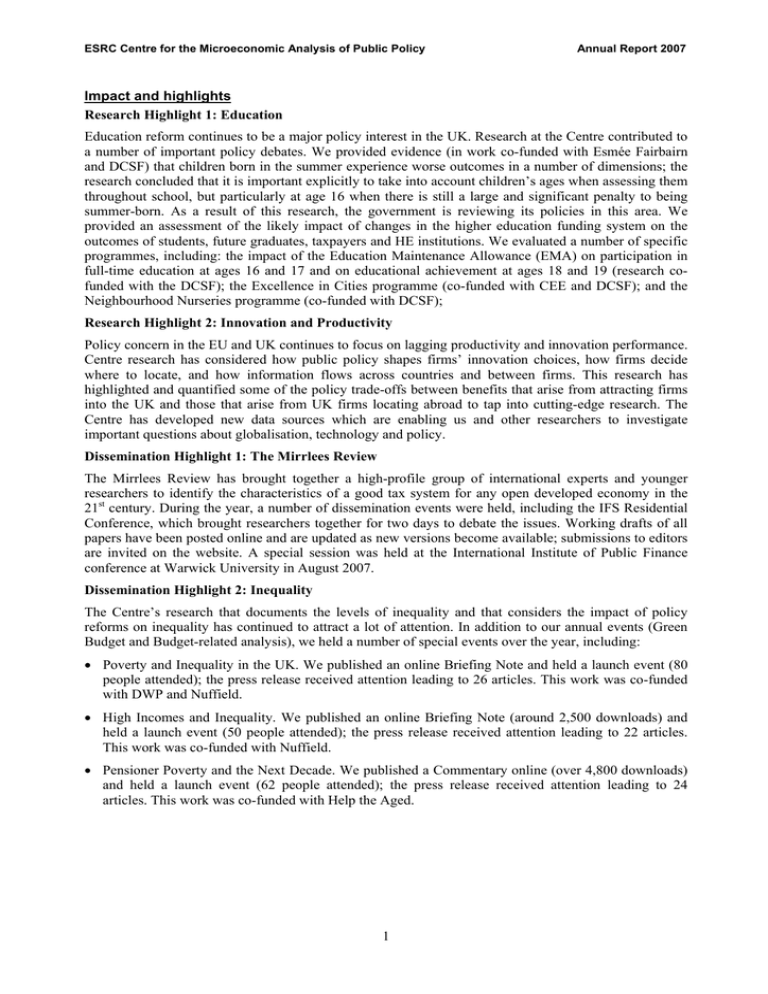
ESRC Centre for the Microeconomic Analysis of Public Policy Annual Report 2007 Impact and highlights Research Highlight 1: Education Education reform continues to be a major policy interest in the UK. Research at the Centre contributed to a number of important policy debates. We provided evidence (in work co-funded with Esmée Fairbairn and DCSF) that children born in the summer experience worse outcomes in a number of dimensions; the research concluded that it is important explicitly to take into account children’s ages when assessing them throughout school, but particularly at age 16 when there is still a large and significant penalty to being summer-born. As a result of this research, the government is reviewing its policies in this area. We provided an assessment of the likely impact of changes in the higher education funding system on the outcomes of students, future graduates, taxpayers and HE institutions. We evaluated a number of specific programmes, including: the impact of the Education Maintenance Allowance (EMA) on participation in full-time education at ages 16 and 17 and on educational achievement at ages 18 and 19 (research cofunded with the DCSF); the Excellence in Cities programme (co-funded with CEE and DCSF); and the Neighbourhood Nurseries programme (co-funded with DCSF); Research Highlight 2: Innovation and Productivity Policy concern in the EU and UK continues to focus on lagging productivity and innovation performance. Centre research has considered how public policy shapes firms’ innovation choices, how firms decide where to locate, and how information flows across countries and between firms. This research has highlighted and quantified some of the policy trade-offs between benefits that arise from attracting firms into the UK and those that arise from UK firms locating abroad to tap into cutting-edge research. The Centre has developed new data sources which are enabling us and other researchers to investigate important questions about globalisation, technology and policy. Dissemination Highlight 1: The Mirrlees Review The Mirrlees Review has brought together a high-profile group of international experts and younger researchers to identify the characteristics of a good tax system for any open developed economy in the 21st century. During the year, a number of dissemination events were held, including the IFS Residential Conference, which brought researchers together for two days to debate the issues. Working drafts of all papers have been posted online and are updated as new versions become available; submissions to editors are invited on the website. A special session was held at the International Institute of Public Finance conference at Warwick University in August 2007. Dissemination Highlight 2: Inequality The Centre’s research that documents the levels of inequality and that considers the impact of policy reforms on inequality has continued to attract a lot of attention. In addition to our annual events (Green Budget and Budget-related analysis), we held a number of special events over the year, including: • Poverty and Inequality in the UK. We published an online Briefing Note and held a launch event (80 people attended); the press release received attention leading to 26 articles. This work was co-funded with DWP and Nuffield. • High Incomes and Inequality. We published an online Briefing Note (around 2,500 downloads) and held a launch event (50 people attended); the press release received attention leading to 22 articles. This work was co-funded with Nuffield. • Pensioner Poverty and the Next Decade. We published a Commentary online (over 4,800 downloads) and held a launch event (62 people attended); the press release received attention leading to 24 articles. This work was co-funded with Help the Aged. 1 ESRC Centre for the Microeconomic Analysis of Public Policy Annual Report 2007 Progress against objectives In this section, we present selected highlights from our research. Labour Supply and Retirement We have reconsidered what optimal income tax rates look like and how earned income tax credits for lone parents should be designed when we consider the effect of unobserved differences across individuals, fixed costs of work and a number of other factors. Overall, our research supports the structure of tax credit reforms we have seen (in particular, the use of hours-contingent payments), but we also provide a strong case for a further reduction of marginal rates for lower earners with school-age children. Research has shown that financial incentives, including both pension accrual and pension wealth, are important determinants of the retirement behaviour of individuals aged 50–59, even after controlling for a wide range of observed characteristics, although the effects are less strong for women. These effects are only important for individuals in good health. We have also made progress in modelling the joint retirement decisions of couples. This is important for policy because the coincidence of joint retirement among couples has been attributed to various explanations. Our research distinguishes joint decisionmaking from other factors, such as correlated preferences and pension incentives. We show that failure to account for cross-spouse influences yields inaccurate predictions of policy effects. Education and Human Capital New research shows that early skills impact significantly on a large range of outcomes (education, employment, wages, teenage pregnancy, truancy and involvement in crime) and that early non-cognitive skills are just as important as early cognitive outcomes. These non-cognitive skills tend to be more malleable, i.e. they can be more easily influenced by government policy interventions. Research has considered how decisions to invest in human capital in developing countries are influenced by factors such as the availability of schools, financial resources, government programmes and grants and perceptions about the returns to education. We consider investment in formal schooling and in pre-school programmes. In the case of a specific programme in Mexico (PROGRESA), we find that the programme could obtain much larger results in terms of school enrolment by eliminating the grant for primary school and increasing the amounts paid for secondary school attendance. Competitiveness, Productivity and Firm Performance In collaboration with the Department for Trade and Industry, we have carried out an analysis of the organisational structure of UK firms and recent changes in their outsourcing behaviour. Along with this descriptive analysis, we have developed theoretical models that link organisational structure to incentives to innovate. This research can help us understand how globalisation will affect innovation patterns. In separate research, we have estimated the impact that UK multinational firms investing abroad has on productive activities in the UK, showing that investment by UK firms in relatively low-wage economies is associated with plant closures in relatively low-skill, labour-intensive industries in the UK. The findings are of interest in the context of the relaxation of barriers to inward investment in low-wage economies. In other work, we provide empirical evidence for the popular idea that geographic distance is becoming less important when considering information flows (the ‘death of distance’) as communication and other technologies become cheaper and more widespread. Consumer Demand, Competition Policy and New Goods A major strand of research has focused on the importance of revealed preference conditions, which summarise the underlying restrictions from consumer optimisation theory. Our focus has been on providing the tightest possible (best) non-parametric bounds on predicted consumer responses to price changes. The responses we estimate are allowed to vary non-parametrically across the income distribution. We have applied these ideas to the analysis of demand responses using detailed householdlevel data. We have developed new panel data on household food purchases that will enable us to extend these methods, and by combining this with information on the firm side, we will also be able to consider how using restrictions from producer profit-maximising behaviour might enable us to improve these bounds. This work is co-funded by a separate ESRC grant. 2 ESRC Centre for the Microeconomic Analysis of Public Policy Annual Report 2007 Dynamics of Inequality, Saving and Wealth Along with work documenting trends in income equality and poverty in the UK (highlighted above), we have shown that trends in income inequality differ from trends in consumption inequality for both the US and the UK over the 1980s and 1990s. This can be explained by changes in the persistence of income shocks. Using new data for the US, we find that individuals are partially able to insure against permanent income shocks, with more insurance possibilities for the college-educated and those approaching retirement. Research, co-funded by a separate ESRC grant, has produced estimates of the pension wealth of respondents to the BHPS, and these data are now available through the Data Archive. We find that one year’s additional membership in a typical public sector pension arrangement is worth around 5% more (as a share of salary) compared with a private sector pension arrangement. We have developed simulation models of life-cycle behaviour which include a realistic mortgage market and the decision as to whether to purchase a house (work co-funded with two separate ESRC grants). We use these models to look at the labour supply of individuals with different housing tenure, in an attempt to explain the empirical observation that women in couples who have an outstanding mortgage are more likely to be working (controlling for other characteristics). In separate research, we also show that the correlation between house prices and consumption at the individual level can be used to describe the dynamics of aggregate consumption over recent boom and bust episodes. Public Finances: Evaluating the Sustainability of Public Finances in the Context of Fiscal Rules Substantial progress has been made on the Mirrlees Review, which aims to identify the characteristics of a good tax system for any open developed economy in the 21st century. IFS published its largest ever Green Budget in January 2008, in collaboration with Morgan Stanley. Highlights include an assessment of the government’s strategy towards public sector pay and pensions, and a detailed analysis of the latest capital gains tax reforms. Capacity building IFS has a strong record in training excellent social scientists. During this period, six PhD students working at IFS or on IFS scholarships, and two visiting post-doctoral students, went on the job market. IFS hosted 55 visiting scholars, including 10 PhD students from other institutions. Centre researchers are involved in running a number of European networks for young researchers, including one on ‘The Evaluation of European Labour Markets’, chaired by Richard Blundell, and one on ‘Science, Technology and Innovation in the Knowledge Economy (STRIKE)’, for which Rachel Griffith sits on the management board. Centre researchers delivered a series of public economics lectures in Oxford, Cambridge and London, which included a panel session about working in economic policy. A survey of participants suggested that 69% felt the lectures encouraged them to pursue a career using economic policy. Dissemination and engagement The ESRC Centre at IFS has a very broad user community, including policymakers, the media, civil society, business, academia and the general public. Throughout the year, Centre researchers engaged with a large number of users. Particular highlights include: • IFS researchers gave over 100 public talks at academic conferences and seminars. • Presentations on research looking at policies targeted towards extending working lives were given at a DWP ministerial seminar on 23 October 2007 and the HM Treasury Economics of Diversity seminar series in mid-November 2007. • Richard Blundell ran a Training Course on Evaluation Methods for the IMF in November 2007. • During the ESRC Festival of Social Science in 2007, we held an event for the general public entitled ‘After Blair: Tax, Spend and the Shape of the State’. Speakers were invited from across the political spectrum and debate was encouraged amongst those attending (84 people). 3 ESRC Centre for the Microeconomic Analysis of Public Policy Annual Report 2007 Investment-specific indicators (listed on the ESRC’s Society Today website) During the period, 38 journal articles were published or forthcoming; two of these were in Econometrica and one in the Quarterly Journal of Economics. Also, 18 chapters were published in edited volumes and 37 working papers were produced. The 104 listed papers and talks given by Centre researchers over the year are a representative selection. The 23 non-academic reports that were published include IFS reports and briefing notes as well as reports prepared for publication by external bodies such as government departments. We held 22 events at IFS aimed at a non-academic audience, and Centre staff took part in many more external events, presenting research findings to a range of non-technical audiences. Centre staff continue to serve on a range of committees and editorial boards, to give evidence to select committees and to advise on policy issues wherever possible. During 2007, Centre staff made around 60 appearances on radio and television, and IFS was mentioned just under 600 times in the printed press. There were peaks in this activity around the time of the Budget and the Comprehensive Spending Review as well as at the launch of our policy reports. The Green Budget, which looks at the Chancellor’s Budget options and is produced in collaboration with Morgan Stanley, attracted 220 people to its launch in 2007; 278 attended the 2008 launch. In 2008, there were 56 mentions of Green Budget research in the printed press, researchers took part in 10 broadcast interviews connected with it and the full document was downloaded from our website around 29,000 times. We updated Fiscal Facts, an online repository of information about taxes, benefits and the public finances. A new briefing note, dealing with local government finances, was added to the collection; it has been downloaded over 3,000 times since its publication. ESRC general indicators for reporting to government a) Number of activities and events involving the general public that have been organised by your research investment: 13 b) Number of projects where co-funding has been attracted. For each project please provide the name of the project and the amount of external funding attracted for each. Funder type Number of grants ESRC Government Charitable trusts International organisations Business, consortia & others Membership Amount of external funding Jan 07 – Dec 07 £1,168,763 £620,070 £458,296 £313,796 £479,599 £68,957 24 19 8 13 7 – Pro rata for period Jan 07 – Mar 08 £1,460,954 £775,088 £572,870 £392,245 £599,499 £86,196 c) Number of public policy and business orientated seminars and workshops that have been held. In each case please detail the name of the seminar/workshop and the date it was held. Event subject area Budget, PBR and similar briefings Consumer behaviour Human capital Political economy Poverty, inequality and well-being Productivity and international tax issues Taxes, benefits and public policy Total Number of events 3 2 2 2 4 4 5 21 d) Number of: (i) non-academic research users hosted by the investment: 3 (ii) researchers placed in user organisations: 2 e) Number of non-academic user members of your investment’s Advisory Committee: 4 4 ESRC Centre for the Microeconomic Analysis of Public Policy Annual Report 2007 Appendix: details of ESRC general indicators for reporting to government a) Number of activities and events involving the general public that have been organised by your research investment. Name of event The economics of consumer credit IFS Green Budget 2007 After Blair: tax, spend and the shape of the state IFS public economics lectures Post-Budget briefing 2007 Poverty and inequality in the UK: 2007 Pensioner poverty over the next decade: what role for tax and benefit reform? 2007 Pre-Budget Report and Comprehensive Spending Review analysis IFS Annual Lecture 2007 by Tim Besley: the political economy of data When you are born matters: the impact of date of birth on child cognitive outcomes in England Racing away? Income inequality and the evolution of high incomes IFS Green Budget 2008 Post-Budget briefing 2008 Date 24 Jan 2007 31 Jan 2007 12 Mar 2007 19 Mar 2007 22 Mar 2007 28 Mar 2007 17 Jul 2007 10 Oct 2007 15 Oct 2007 24 Oct 2007 17 Jan 2008 30 Jan 2008 13 Mar 2008 b) Number of projects where co-funding has been attracted. For each project please provide the name of the project and the amount of external funding attracted for each. Funder type Project title ESRC ESRC ESRC ESRC ESRC ESRC ESRC ESRC ESRC ESRC ESRC ESRC ESRC ESRC ESRC ESRC ESRC ESRC ESRC ESRC ESRC ESRC ESRC ESRC Government Government Government Government Government Government Government Government Government Public Finances Analysis Internet Access to Research Methods Training Material Professorial Fellowship Late Life Work, Health and Retirement Inequalities in Health Advancing Programme Evaluation Methods Investment: Constraints on Firms Trade Integration & Trade Policy Econometric Training Product Market Competition Public Policy & Fertility Paying for Innovative Consumer Products Housing Expenditure & Household Welfare Widening Participation in HE Evaluation and Design of In-Work Benefits School Supply & Cash Transfers DfID/ESRC Using Theory & Simulation Methods Knowledge Transfer to Students Impact of HEIs on Regional Economics Roberts Skills Training Funds Globalisation, Innovation and Productivity Cemmap: The Centre for Microdata Methods & Practice Econometrics Study Group 2007–09 Education Research Centre Employment Retention & Advancement Pathways to Work Pilots Labour Supply Updates Northern Ireland Tax & Benefit Modelling ELSA Ethnic Parity Evaluation of In-Work Credits and Other Benefits Saving Gateway 5 External funding in 2007 £4,609 £1,668 £66,827 £83,123 £26,708 £23,515 £117,848 £22,240 £12,404 £43,393 £775 £12,614 £50,790 £19,331 £33,198 £40,121 £206,000 £37,928 £5,833 £12,782 £24,210 £44,453 £277,064 £1,329 £107,188 £30,981 £86,412 £1,233 £9,272 £56,553 £16,620 £35,370 £58,128 ESRC Centre for the Microeconomic Analysis of Public Policy Government Government Government Government Government Government Government Government Government Government Charitable Trust Charitable Trust Charitable Trust Charitable Trust Charitable Trust Charitable Trust Charitable Trust Charitable Trust International International International International International International International International International International International International Other Other Other Other Other Other Other Annual Report 2007 Partnership Transitions Employer Training Pilots HBAI 06/07 Evaluating the Impact of EMA on Attainment Analysis of Patterns of Business Location Decisions in the UK Analysis of Firm Structures & Outsourcing in the UK Higher Education Finance in Scotland: Scotland’s Competitive Position Asset Ownership, Portfolios & Retirement Savings Arrangements HBAI 07/08 Work Retention Leverhulme Centre Primary School Admission Pensioner Poverty Attitudes to Education Poverty & Inequality in Britain 2007–09 Lone Parents, Tax Credits and ‘Mini Jobs’ Level Playing Field? The Implications of School Funding Understanding the Compliance Costs of Benefits & Tax Credits Joint Retirement Microdata Methods & Practice Axiomatic Approach to Measuring Productivity Inequality in South America Socio-Economic Status & Health Housing Employment & Health at 50+ Evaluation of Programme of Peace & Development Feasibility Study for a Randomised Impact Evaluation Comparative Analysis of Private Pension Systems in South America Impact Evaluation of the Colombian Subsidised Health Insurance Micro Finance in Mongolia Tax Law Review Committee Savings & Retirement Tax and NICs Mirrlees ESRC Mirrlees Nuffield Green Budget 2007 Green Budget 2008 £40,124 £24,787 £25,601 £46,206 £16,184 £11,334 £14,259 £22,057 £13,328 £4,433 £229,279 £358 £39,360 £135,293 £27,277 £14,001 £9,246 £3,482 £30,807 £168,044 £6,502 £19,545 £33,301 £17,149 £1,668 £8,452 £6,309 £10,493 £8,666 £2,860 £51,599 £10,000 £1,860 £163,682 £186,798 £34,017 £31,643 c) Number of public policy and business orientated seminars and workshops that have been held. In each case please detail the name of the seminar/workshop and the date it was held. Name of event The economics of consumer credit IFS Green Budget 2007 2007 EEAG Report on the European Economy After Blair: tax, spend and the shape of the state IFS public economics lectures Post-Budget briefing 2007 Poverty and inequality in the UK: 2007 IFS Residential Conference: reforming the tax system for the 21st century – the Mirrlees Review The welfare implications of international taxation and tax competition Technology, productivity and public policy ESRC/HMRC public economics conference Pensioner poverty over the next decade: what role for tax and benefit reform? Partnership transitions and mothers’ employment 2007 Pre-Budget Report and Comprehensive Spending Review analysis IFS Annual Lecture 2007 by Tim Besley: the political economy of data 6 Date 24 Jan 2007 31 Jan 2007 28 Feb 2007 12 Mar 2007 19 Mar 2007 22 Mar 2007 28 Mar 2007 12–14 Apr 2007 23 Apr 2007 17 May 2007 14–15 Jun 2007 17 Jul 2007 18 Sep 2007 10 Oct 2007 15 Oct 2007 ESRC Centre for the Microeconomic Analysis of Public Policy When you are born matters: the impact of date of birth on child cognitive outcomes in England Racing away? Income inequality and the evolution of high incomes IFS Green Budget 2008 Financial markets and household consumption Globalisation of innovation (Festival of Social Science) Post-Budget briefing 2008 7 Annual Report 2007 24 Oct 2007 17 Jan 2008 30 Jan 2008 18 Feb 2008 7 Mar 2008 13 Mar 2008
